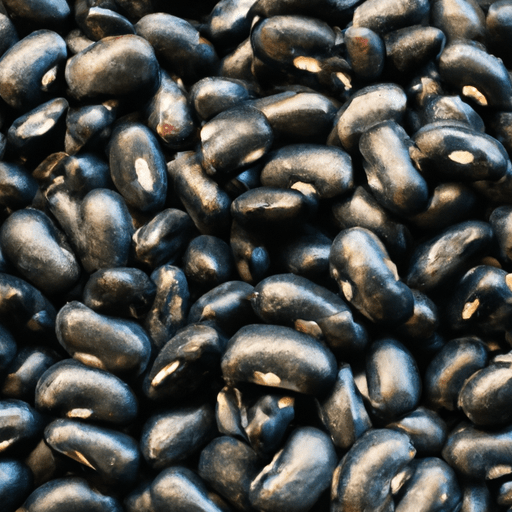Exploring the Versatility and Delights of Raw Black Beans
Beans, beans, the magical fruit! The more you eat, the more you… Wait a second! We’re talking about raw black beans here – an ingredient that’s versatile, nutritious, and downright delicious. Join me as we delve into the depths of raw black beans and uncover the culinary wonders they hold.
Taste and Texture
Raw black beans are small, shiny, and resemble little stones with a matte finish. The taste of these uncooked legumes is slightly earthy, nutty, and dense, with a subtly sweet undertone. They possess a firm texture that may require a bit more cooking time to fully soften than their canned counterparts.
Culinary Uses
Raw black beans are a kitchen staple, frequently utilized in a multitude of culinary creations. Once cooked, they become delightfully soft, creamy, and versatile in their applications. From soups and stews to salads and dips, the possibilities are nearly endless.
One popular use for cooked black beans is the beloved black bean burger. Combining cooked black beans, spices, and various vegetables, these patties offer a tasty and nutritious alternative to meat-based burgers. Additionally, cooked black beans can be mashed and used as a base for dips, spreads, and fillings, adding both flavor and texture to your favorite snacks and appetizers.
Nutritional Powerhouse
Beyond their culinary charm, raw black beans pack a nutritional punch that makes them a valuable addition to any diet. These legumes are a rich source of protein, fiber, vitamins, and minerals. They specifically shine in terms of iron and folate, providing essential elements for overall health and well-being.
Incorporating raw black beans into your meals can offer numerous health benefits. The high fiber content aids in digestion, promotes satiety, and supports heart health. The protein content makes them an excellent choice for those following a vegetarian or vegan lifestyle.
Historical Significance
Black beans have a vibrant history rooted in Latin American and Caribbean cuisines, where they are commonly used. Native to the Americas, these legumes have been an important part of traditional cuisine since ancient times. From Aztec stews to Caribbean rice and beans, black beans have graced countless tables throughout history.
Furthermore, black beans hold cultural significance in celebrations such as the Brazilian Feijoada or the Cuban Moros y Cristianos. These traditional dishes not only symbolize togetherness but also showcase the versatile nature of black beans in various culinary traditions.
Interesting Facts
- Black beans get their dark color from anthocyanins, which are powerful antioxidants.
- Did you know that black beans are also known as turtle beans due to their shiny appearance and hard shell-like texture?
- Unlike many dried legumes, raw black beans do not require soaking before cooking. However, a longer cooking time may be necessary to achieve optimal tenderness.
Raw black beans may appear humble at first glance, but their potential in the culinary world is immense. From their unique taste and texture to their nutritional benefits and rich history, black beans have earned their rightful place in our kitchens and on our plates. So, the next time you embark on a culinary adventure, don’t forget to invite these little legumes along for the ride!
Raw Black Beans
Origin: Black beans, also known as turtle beans, have been cultivated in the Americas for over 7,000 years. They are believed to have originated in Central and South America, with evidence of their consumption found in ancient civilizations such as the Aztecs and Mayans.
Common Uses: Raw black beans can be cooked and used in a variety of dishes. They are a staple ingredient in Latin American and Caribbean cuisine, often used in dishes like black bean soup, rice and beans, and refried beans. Black beans are also commonly used in veggie burgers, salads, and stews.
Nutritional Benefits: Raw black beans are highly nutritious and provide an excellent source of plant-based protein, dietary fiber, and various vitamins and minerals. They are particularly rich in folate, iron, magnesium, and potassium. Black beans are also low in fat and contain no cholesterol.
Unique Properties: Black beans get their name from their dark, almost black skin. When cooked, they have a creamy texture and a rich, earthy flavor. Like other legumes, raw black beans need to be soaked and cooked before consumption to improve digestibility and remove naturally occurring toxins.
Historical Significance: Black beans have played a significant role in the culinary traditions of the Americas. They were an important food source for indigenous peoples and have continued to be a staple ingredient in Latin American cuisine. Black beans also have cultural and historical significance in the Caribbean and Mexican cuisines, where they are often featured in traditional dishes.




Use the share button below if you liked it.
It makes me smile, when I see it.